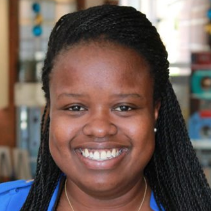 Monique Mendes recently completed her Ph.D. in neuroscience at the University of Rochester in New York. She is the first Black woman to receive a doctorate from the institution in the field of neuroscience.
Monique Mendes recently completed her Ph.D. in neuroscience at the University of Rochester in New York. She is the first Black woman to receive a doctorate from the institution in the field of neuroscience.
Dr. Mendes, who is originally from Jamaica, obtained her undergraduate degree in biology from the University of Florida. She chose the University of Rochester Medical Center’s Del Monte Institute for Neuroscience to pursue her doctoral degree. Recently, Dr. Mendes successfully defended her thesis, titled “The Kinetics of Microglial Ontogeny and Maturation in the Adult Brain.”
Dr. Mendes will now engage in a postdoctoral fellowship at Stanford University. There she will conduct research on how learning and memory are impacted by specific cells called glia, which are associated with brain health, development, and repair from injury.


Correction JBHE, I think you meant to say the “first Jamaican American” and not “first Black American”. Let’s be intellectually honest. In many instances persons from both the Caribbean and the continent of Africa normally Do Not identify, associate, or align” themselves with native born Black Americans. The only time this happens is when such persons are benefiting in various arenas they want to be aligned with “native born Black America” or when they’re on the receiving end of Disparate Treatment by their White colleagues within the higher education landscape.
Michael, this is a rebuttal to your comments above about the brief introduction and bio of Dr. Monique Mendes published by JBHE. I read the info several times; could not find where she is referred to as a first Black American. What is inscribed in the title and in the body of this short article is that Dr. Monique Mendes is “The First Black Woman to Earn a PHD in Neuroscience at the University of Rochester; is originally from Jamaica.” I identify myself as Afro-Caribbean. I always have to correct some in American society when they refer to me as African-American due to the color of my skin. Once I open my mouth and start speaking then they pause and ask me, “Where are you from?” To me, the word Black here implies that the person in question is of the African Diaspora.
Agreed. I am also from Jamaica. Dr. Mendes attaended my high school, the Immaculate Conception High School for Girls and we are very proud of her achievement. In my opinion her achievement elevates all people of color regardless of the country of their origin. The cause of American born Blacks is enhanced by the achievements of Black persons regardless of their country of origin. Let’s celebrate Dr. Mendes and not try to diminish her.
Dr. Voltaire,
I appreciate your intellectual honesty. You totally missed the overall gist of my initial comment. I was specifically referring to the title as written by JBHE.
Regarding your self-identifying as “Afro-Caribbean” within a US context clearly shows your own unconscious bias (towards “native born Black Americans”) in not wanting to be affiliated with that particular group. You’re not the only one who does this once in the USA. I would venture in saying this stems from years of miseducation (i.e., the ‘Colonial Education Project’) given the historical and currently negative narrative that has been put out this particular group.
As a result, many of you and your “Afro-Caribbean” comrades unconsciously have the same mentality as White racists in how you view “native born Black Americans”. However, if the narrative for “native born Black Americans” were the being seen as the financiers, lawyers, doctors, ‘titans of industry and technology, you and your “Afro-Caribbean” comrades would be easily self-identify as “Black Americans”.
Let’s be clear. Jamaica, and the rest of the Caribbean is mired in a caste system, fractured economies and failing infrastructure, neocolonialism and colorism.